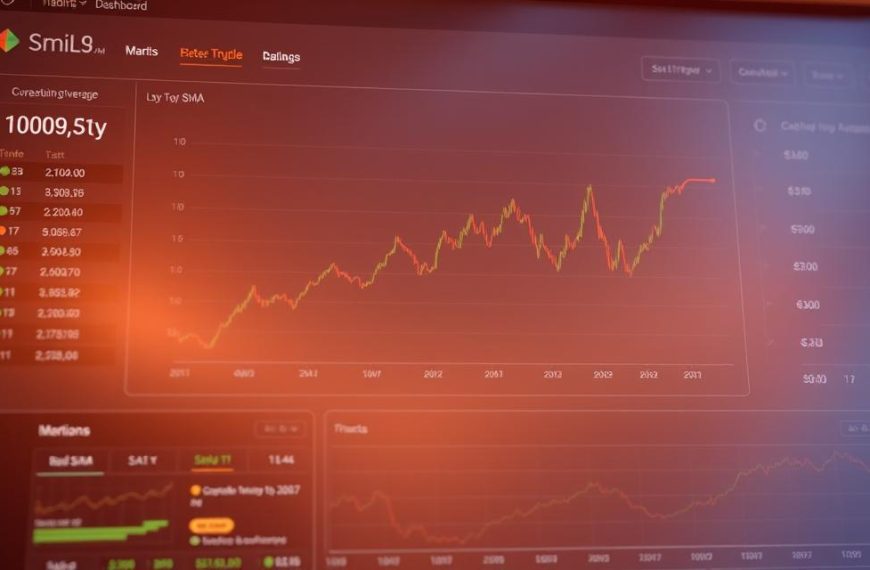The US cryptocurrency scene has evolved rapidly. Investors now seek clever ways to cash out Bitcoin. Converting Bitcoin to USD has become more sophisticated, offering various options for digital asset holders1.
Daily Bitcoin transactions on US exchanges exceed $2 billion. This shows strong market activity and growing investor interest1. Traders are exploring different strategies to convert digital assets into traditional currency.
Cashing out Bitcoin requires knowledge of platforms, limits, and financial implications. Investors must consider verification requirements, exchange fees, and potential tax obligations. These factors are crucial when converting cryptocurrencies.
Modern exchanges offer flexible Bitcoin cash-out options. Daily withdrawal limits range from $30 to $100,000, depending on the platform2. Choosing the right method requires careful evaluation of financial goals and risk tolerance.
New technologies are reshaping cryptocurrency conversion. They offer streamlined solutions for traders turning digital assets into traditional currency. Staying informed about market trends and platform capabilities is vital for successful cash-out strategies.
Understanding Bitcoin Cash-Out Fundamentals
Converting Bitcoin to cash demands a strategic approach. Grasping the basics is vital for investors aiming to maximise their digital assets. It’s crucial to understand the process thoroughly3.
Investors must weigh several key factors when cashing out cryptocurrency. These include transaction fees, processing times, and tax implications.
- Transaction fees and associated costs
- Processing times for different platforms
- Tax implications of Bitcoin sales
The Basics of Converting Bitcoin to Cash
Bitcoin conversion involves choosing from various exchange platforms. Each platform has its own set of requirements. The tax on cryptocurrency disposal varies from 0-20%, depending on how long you’ve held it3.
Key Considerations Before Cashing Out
| Consideration | Impact |
|---|---|
| Holding Period | Determines tax rate (short-term vs long-term) |
| Exchange Platform | Affects transaction fees and processing speed |
| Market Conditions | Influences potential profit margins |
Market Timing and Value Assessment
Timing Bitcoin sales requires careful analysis of market trends. It’s also important to consider your personal financial goals. Long-term holdings might qualify for more favourable tax rates3.
Strategic planning is key to successful cryptocurrency cash-outs.
Popular Cryptocurrency Exchanges for Bitcoin Sales
US crypto exchanges offer various options for Bitcoin investors. Several robust centralised exchanges provide unique features and competitive pricing. Careful consideration is essential when choosing an exchange.
Top Bitcoin trading platforms offer diverse cryptocurrency transaction options. Coinbase supports over 200 cryptocurrencies with fees from 0.00% to 0.60%. Its user-friendly interface suits both novice and experienced traders.
- Kraken offers transaction fees between 0.00% and 0.40%4
- Supports over 200 cryptocurrencies5
- Minimum purchase starts at just $14
When choosing centralised exchanges, investors should consider several key factors. These include:
- Transaction fees
- Cryptocurrency variety
- Minimum deposit requirements
- Platform security
Crypto.com is another notable platform supporting over 350 cryptocurrencies. Its transaction fees range from 0.00% to 0.075%. Each exchange offers unique advantages, so compare options carefully.
Pro tip: Always review the latest fee structures and platform features before initiating any cryptocurrency transactions.
The right US crypto exchange can greatly impact your Bitcoin selling experience. It ensures optimal returns and a smooth transaction process. Choose wisely to make the most of your investment.
How do I cash Bitcoins in the US?
Converting Bitcoin to cash in the US is simpler than you might think. There are several ways to turn your digital coins into spendable funds. Let’s explore the most efficient methods.
Coinbase and Gemini are top choices for cashing out Bitcoin in the US6. These platforms offer secure and regulated environments for cryptocurrency transactions. They’re trusted by many investors for their reliability.
Step-by-Step Cash-Out Process
- Select a reputable cryptocurrency exchange
- Create and verify your account
- Link your bank account
- Initiate the Bitcoin sale
- Transfer funds to your bank account
Verification Requirements
KYC verification is essential for Bitcoin transactions on exchanges like Coinbase and Gemini6. You’ll need to provide thorough identity checks during account setup. This ensures the safety and legality of your transactions.
- Government-issued photo identification
- Proof of address
- Social security number
- Bank account verification
Processing Times and Limits
Transaction processing times differ between platforms. Coinbase’s ACH system typically takes a few business days for withdrawals6. Your verification level and the exchange you use determine withdrawal limits.
Transaction fees can greatly affect your cash-out strategy. Most exchanges charge either flat or percentage-based fees7. Some services like BlockTrade offer no fees, while Bitcoin ATMs may charge up to 15%7.
Pro tip: Always compare fees and processing times across different platforms to maximise your Bitcoin cash-out value.
Centralised Exchange vs Peer-to-Peer Trading
Investors must choose between centralised exchanges and direct crypto sales platforms for P2P Bitcoin trading. Cryptocurrency exchanges offer various ways to sell Bitcoin, each with its own perks8.
Centralised exchanges rule the cryptocurrency market, handling about 90% of global trading volume8. These platforms boast high transaction speeds and multiple trading pairs.
They also provide robust customer support. Fees on centralised exchanges typically range from 0.1% to 0.5%, making them quite cost-effective8.
- High transaction speeds
- Multiple trading pairs
- Robust customer support
Peer-to-peer trading offers more flexibility but requires extra effort from the trader. It allows for direct price and payment method negotiations.
| Exchange Type | Trading Volume | Average Fees |
|---|---|---|
| Centralised Exchanges | 90% | 0.1% – 0.5% |
| Decentralised Exchanges | 10% | 0.2% – 0.3% |
P2P platforms can potentially lower transaction costs and provide more personalised trading experiences9. This approach suits traders looking for unique arrangements.
Choosing between centralised and peer-to-peer trading depends on your individual risk tolerance and transaction requirements.
Bitcoin ATMs and Physical Cash-Out Options
Bitcoin ATMs offer a quick way to convert digital assets into cash. These machines provide a physical method for Bitcoin sales. Crypto enthusiasts can now access cash conveniently through these unique machines10.
The US has seen a massive growth in Bitcoin ATM locations. Over 34,000 machines are now available nationwide10. These specialised ATMs differ from traditional bank machines, offering a unique approach to crypto transactions.
Locating Bitcoin ATMs
Finding nearby Bitcoin ATMs has become quite easy. Several online platforms and mobile apps can help locate these machines quickly.
When searching, consider these strategies:
- Use cryptocurrency ATM mapping websites
- Check local financial districts
- Explore cryptocurrency-friendly urban areas
- Verify machine capabilities before visiting
Transaction Fees and Limits
Understanding crypto ATM fees is crucial for smart transactions. Bitcoin ATMs typically charge between 7% to 15% in transaction fees10.
Some operators like Bitcoin Depot might charge up to 20%11.
| Transaction Type | Typical Fee Range | Daily Limit |
|---|---|---|
| Bitcoin Purchase | 7-15% | Up to $10,000 |
| Bitcoin Sale | 7-15% | Up to $10,000 |
Security Considerations
Bitcoin ATMs offer convenience, but users must prioritise safety. Some machines require ID verification11. Transactions are not protected by FDIC insurance11.
Always choose reputable ATM operators. Be aware of potential risks when using these machines.
Approximately 70% of Bitcoin ATM users prefer cash transactions for privacy reasons10.
The average Bitcoin ATM transaction takes about 10 minutes. This makes it a quick method for converting cryptocurrency to cash10.
Using Crypto Debit Cards for Cash Access
Crypto debit cards have changed how people handle digital assets. They link Bitcoin holdings to everyday spending. Users can now quickly turn cryptocurrency into cash12.
Top crypto debit cards offer unique perks. Crypto.com gives 0% to 8% cashback. Coinbase Card provides 0.5% cashback on crypto transactions. Wirex boasts 0.5% to 8% cashback rewards12.
- Crypto.com debit card provides cashback rewards ranging from 0% to 8%12
- Coinbase Card offers 0.5% cashback on cryptocurrency transactions12
- Wirex debit card boasts cashback rewards between 0.5% and 8%12
When choosing a Bitcoin debit card, consider these key factors:
- Cashback rates
- Transaction fees
- Withdrawal limits
- Geographical availability
Quick Bitcoin conversion is a major perk of these cards. Crypto.com needs a £500 stake for 2% cashback. Higher investments can earn up to 8% rewards12.
Some cards have fees. BitPay charges a 2% transaction fee. Users should factor this into their spending plans12.
Crypto debit cards transform digital assets into practical spending power, bridging the gap between cryptocurrency and real-world transactions.
Be aware of possible limits. Coinbase Card has a £2,500 daily spend cap. Converting cryptocurrency may have tax implications12. Choose your crypto debit card wisely to maximise benefits in the digital currency world.
Tax Implications of Bitcoin Cash-Outs
Understanding IRS cryptocurrency guidelines is crucial for Bitcoin investors. Accurate tax reporting is essential to avoid penalties. Proper management of Bitcoin transactions can help navigate the tax landscape.
The IRS views cryptocurrencies as property. This means every Bitcoin cash-out can trigger a taxable event13. Investors must carefully track their crypto capital gains when converting Bitcoin to cash.
Capital Gains Reporting
Bitcoin transactions have different tax implications based on holding time:
- Short-term capital gains (held for one year or less) are taxed at ordinary income rates ranging from 10% to 37%14
- Long-term capital gains (held over one year) benefit from reduced tax rates of 0%, 15%, or 20%15
Record Keeping Requirements
Detailed transaction records are vital for accurate Bitcoin tax reporting. Investors should document:
- Purchase dates and prices
- Sale dates and proceeds
- Transaction fees
- Exchange platforms used
Tax Planning Strategies
Strategic planning is key to effective tax management. Consider these approaches:
- Tax-loss harvesting to offset gains
- Timing sales to optimise tax brackets
- Tracking cost basis carefully14
| Transaction Type | Tax Treatment |
|---|---|
| Selling Bitcoin | Capital Gains Tax |
| Receiving Bitcoin as Payment | Ordinary Income |
| Crypto Mining | Ordinary Income |
New IRS regulations will require more comprehensive cryptocurrency reporting from January 202514. Staying informed and keeping precise records will be crucial for compliance.
Security Measures for Large Bitcoin Transactions
Safeguarding digital assets during crypto transactions demands a thorough security approach. As cybercriminals target digital currency platforms, robust measures are vital for large Bitcoin transfers16. Digital asset protection has become more intricate with growing cryptocurrency adoption.
Investors can employ several key strategies to protect their digital wealth:
- Utilise multi-signature wallets for enhanced security17
- Implement two-factor authentication (2FA) on all accounts16
- Use cold storage solutions for large Bitcoin holdings17
- Conduct regular security audits16
The financial risks are substantial. Cryptocurrency theft reached $3.8 billion in 2022, emphasising the need for strong security measures17.
Cold wallets offer extra protection, with non-custodial options costing about £200. They provide offline storage, preventing direct internet-based attacks17.
Staying alert is crucial. Users must watch for sophisticated phishing attacks and other security threats16. Combining tech solutions with personal awareness can greatly reduce unauthorised access risks.
Security is not a destination, but a continuous journey in the world of cryptocurrency.
Platform Limits and Withdrawal Restrictions
Understanding crypto exchange withdrawal limits is vital for effective planning. These restrictions can greatly affect your Bitcoin cash-out strategy. It’s crucial to grasp the complexities of digital asset transactions.
Crypto platforms set various withdrawal limits to protect users and meet regulations. These caps differ widely across platforms. This creates unique challenges for investors looking to sell their digital assets.
Daily Withdrawal Caps
Daily withdrawal caps are key for strategic Bitcoin cash-outs. Many platforms set strict limits to manage risk and prevent fraud.
- Basic account verification typically allows £500-£1,000 daily withdrawals
- Advanced verification can increase limits to £10,000 or more
- Some platforms offer tiered withdrawal structures based on account history
Verification Level Requirements
Crypto platforms use multi-level verification to set withdrawal limits. Higher verification levels allow larger withdrawals18. Users usually need to complete:
- Identity verification with government-issued documentation
- Proof of address
- Additional security checks
Pro tip: Complete comprehensive verification early to maximise your crypto platform restrictions flexibility.
Planning around Bitcoin cash-out caps helps manage large transactions smoothly. Understanding platform-specific limits is crucial. This knowledge allows you to create a solid withdrawal strategy.
With a well-planned approach, you can minimise disruptions to your transactions. This ensures you maintain control over your financial moves in the crypto world.
Alternative Methods for Converting Bitcoin to Cash
Bitcoin conversion alternatives offer more than just traditional exchange platforms. Crypto enthusiasts now have various options to turn digital assets into practical value19. One innovative approach involves converting crypto to gift cards, providing spending flexibility across multiple retailers20.
Services like BitPay allow users to buy gift cards directly with Bitcoin. This method turns digital currency into spendable credit at popular stores. Users can enjoy instant Bitcoin conversion and a wide range of retailer options.
These services also offer lower transaction fees compared to traditional exchanges.
- Instant conversion of Bitcoin
- Wide range of retailer options
- Lower transaction fees compared to traditional exchanges
OTC Bitcoin trading is another sophisticated option, especially for large transactions. Over-the-counter trading desks offer personalised services for investors with significant cryptocurrency portfolios19. These platforms provide dedicated trading specialists and competitive pricing.
They also ensure enhanced privacy for large transactions.
- Dedicated trading specialists
- Competitive pricing
- Enhanced privacy for large transactions
New technologies are expanding Bitcoin monetisation strategies. Some platforms now offer crypto-backed loans, letting investors use their digital assets without selling21. This approach provides liquidity while maintaining potential long-term investment value.
Pro tip: Always compare fees and evaluate the most suitable conversion method for your specific financial needs.
Carefully assess each alternative, considering factors like transaction fees and processing times. Also, think about potential tax implications19. The cryptocurrency landscape keeps evolving, offering new ways to unlock digital asset value.
Conclusion
Cashing out Bitcoin requires careful planning and understanding. Our guide emphasises choosing the right liquidation methods for your goals. The crypto market’s ups and downs mean you must consider timing and platform choice carefully.
Bitcoin cash-out options range from exchanges to peer-to-peer platforms. Each has its pros and cons. Florida’s new rules show why it’s crucial to stay aware of regulations22.
Some investors see Bitcoin as a shield against traditional market swings23. Knowing tax rules, security measures, and market trends is key for successful Bitcoin sales.
As digital money grows, keep up with new laws and market changes. This knowledge will help you make the most of your crypto investments.
Our guide helps you make smart choices about Bitcoin cash-outs. It shows how to turn your digital coins into real-world money confidently.
Remember, good crypto management isn’t just about quick trades. It’s about using smart strategies based on solid information.
FAQ
What is the safest way to cash out Bitcoin in the US?
How are Bitcoin sales taxed in the United States?
What are the transaction limits when cashing out Bitcoin?
Are there fees associated with converting Bitcoin to cash?
How long does it take to cash out Bitcoin?
What documents do I need to cash out Bitcoin?
Can I cash out Bitcoin anonymously?
What are the best platforms for cashing out Bitcoin in the US?
How can I minimise taxes when cashing out Bitcoin?
Are there alternatives to selling Bitcoin for cash?
Source Links
- https://www.bitdegree.org/crypto/tutorials/how-to-cash-out-bitcoin
- https://www.bitpay.com/blog/cash-out-bitcoin
- https://coinledger.io/blog/how-to-cash-out-crypto-without-paying-taxes
- https://www.investopedia.com/best-crypto-exchanges-5071855
- https://www.businessinsider.com/personal-finance/investing/best-crypto-bitcoin-exchanges
- https://coincentral.com/how-to-turn-bitcoin-into-cash-usd/
- https://blocktrade.com/learn/turn-bitcoin-into-cash/
- https://coinbureau.com/education/centralized-vs-decentralized-crypto-exchanges/
- https://www.investopedia.com/terms/b/bitcoin-exchange.asp
- https://www.bitcoin.com/get-started/how-to-locate-and-use-a-bitcoin-atm-to-buy-bitcoin-with-cash/
- https://www.bankrate.com/banking/what-are-bitcoin-atms/
- https://coinledger.io/tools/best-crypto-debit-cards
- https://www.irs.gov/individuals/international-taxpayers/frequently-asked-questions-on-virtual-currency-transactions
- https://www.investopedia.com/tech/taxes-and-crypto/
- https://gordonlaw.com/learn/crypto-taxes-how-to-report/
- https://www.arkoselabs.com/explained/guide-to-cryptocurrency-security/
- https://www.investopedia.com/news/bitcoin-safe-storage-cold-wallet/
- https://www.nationwide.co.uk/help/fraud-and-security/cryptocurrency-payment-restrictions
- https://swissmoney.com/how-to-turn-bitcoin-into-cash/
- https://www.cryptodispensers.com/blog/withdraw-bitcoin
- https://www.xe.com/blog/personal-finance/how-to-convert-bitcoin-into-real-money/
- https://www.klgates.com/Trouble-in-Paradise-Florida-Court-Rules-that-Selling-Bitcoin-is-Money-Transmission-02-13-2019
- https://www.fidelitydigitalassets.com/research-and-insights/adding-bitcoin-corporate-treasury
















